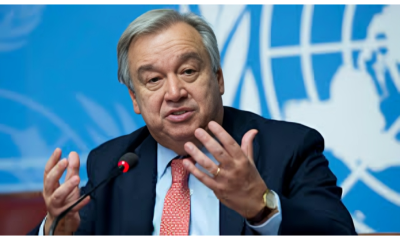Health
Nigeria Ranks High in TB Infection Despite Free Testing, FG Laments

By Laide Akinboade, Abuja
The Federal Government has expressed dismay with the country’s position in the recent World Health Organization’s Tuberculosis ranking.
“It is unfortunate that despite the availability of free testing and medication, Nigeria still ranked highest among countries in the world with TB especially among children,” Health Minister Osagie Ehanire, told a press conference organized on Friday, to commemorate the 2023 world TB day.
In the WHO’s global TB report, Nigeria ranks as the 6th country in the world and the first in Africa with the highest number of people infected with TB. It is also included among the 8 countries that have two-thirds of global TB cases.
According to Osagie who was represented by the State Minister of Health Ekumankama Joseph, Nigeria’s position on the ranking was a result of various negative factors:
“There are 467,000 TB cases in Nigeria in 2021. In 2022 there was an estimated 479,000 TB cases in Nigeria out of which 285, 562 were notified. In 2022, there is an estimated 3,932 Drug Resistance Tuberculosis cases were diagnosed and 3,185 (81%) were enrolled on second-line treatment,” he said.
The Minister further said the problems were compounded by the citizens’ ignorance of the TB virus. “Only one out of every four Nigerians has adequate knowledge about TB.”
However, the minister said the country recorded some improvement in the area of Human Immunodeficiency Virus (HIV) testing among TB patients as 97% of Nigeria’s TB patients have documented HIV results, which was far higher than the global and African region averages of 76% and 89% respectively.
“The federal government is committed to ensuring the end of TB in Nigeria. All the interventions of the Federal Government are yielding positive results. We have been able to expand the TB facilities from 2, 038 in 2014 to over 20, 000,” he said.
The Minister also called on Nigerians to take an active role in ending the transmission of Tuberculosis in the country. “If you or anyone you know is coughing for more than two weeks ensure that you get tested,” he advised.
Also Speaking, the WHO’s Country Representative (WR) Dr. Walter Mulombo, represented by Dr. Laxmikant Chavan WHO’s Technical Officer said that Nigeria at the United Nations High-Level Meeting (UNHLM) on TB in 2018 made a commitment to diagnose and treat 1,109,000 TB cases and place 2,183,890 clients on TB preventive Therapy (TPT) from 2018 to 2022.
“But after the end of 2022, Nigeria is yet to achieve this commitment as available reports show that the country is trailing behind in all the set targets,” he said.
He noted that TB control budgets in Nigeria continue to be drastically underfunded.
“About 69% of the TB budget in 2021 was unfunded, this is a major threat to the country’s efforts in achieving the set targets. Too many people are pushed into poverty when they contract TB due to lost income, transport costs, and other expenses. 71% of the TB patients in Nigeria and their households are affected by catastrophic cost due to TB.”
Dr. Walter reiterated WHO’s continued support to Nigeria in developing and implementing guidelines, plans, frameworks, and strategic documents to end the TB epidemic in Nigeria.
“In addition, we will facilitate research to provide evidence-based interventions and innovations for finding the missing TB cases and enhancing the country’s efforts in reaching the set targets. We will continue to work with the programme to build the capacity of senior and middle-level managers across the states on the needed knowledge and skills for improving quality of care and data analysis towards formulating evidence-based policies for enhancing programme performance at all levels. In addition, we will continue to support monitoring of the programme at all levels, in real-time, to identify challenges and advise on strategies to address the challenges,” he said.
Also, the Deputy Director, Office of HIV/ AIDS and TB USAID Nigeria, Omosalewa Oyelaran said since 2003, Nigeria remains in the top 10 countries affected by TB, with one of the lowest detection rates globally.
She said to combat this debilitating disease; USAID collaborates with the Government of Nigeria and other national and international partners to support the National Tuberculosis Program. Since 2003, USAID has contributed more than $250 million to TB control efforts in Nigeria.
In 2022 alone, USAID programs helped screen over 15 million individuals for TB. USAID’s support also includes the provision of TB screening, diagnostic, treatment, and preventive services in 18 states through community and facility-based interventions.
“In partnership with the Government of Nigeria, USAID’s ‘TB Accelerator’ model invested in local civil society organizations (CSOs) to increase access to quality TB prevention, diagnosis, and treatment, including multi-drug resistant TB.
“These local CSOs collaborate with the national and state TB programs to deploy, and scale, state-of-the-art equipment and tools to improve the detection of TB. USAID also facilitates multi-sectoral public-private partnerships to increase public awareness and advocate for domestic resources to address the TB epidemic in Nigeria. As a result, Nigeria realized a significant increase in TB case finding and treatment coverage over the past three years.
“Despite the additional challenges posed by the COVID-19 pandemic, we have achieved significant results working together in partnership with GON and Global Fund.
“We commend the Government of Nigeria’s efforts to sustain the accelerated service delivery that resulted in yearly case notification increases of 160 percent between 2019 and 2022.
“However, much remains to be done if Nigeria is to meet its TB control target of ending the TB epidemic by 2035. We must continue to work together to reach all TB patients and their contacts in Nigeria.
“However, the greatest challenge is the funding gap, which is estimated to be 70 percent of the resources needed to effectively control TB. Therefore, I call on you to mobilize domestic resources to meet this funding gap through budgetary allocations, the inclusion of TB services in health insurance schemes, and enhanced private sector engagement”, she said.
The Ag. Board Chair, Stop TB Partnership Nigeria, Dr. Queen Ogbuji in her goodwill message said out of the annual estimate of 479,000 TB cases in Nigeria, only 285,561 were notified.
According to her, it’s good progress in the right direction, considering the fact that Nigeria was able to increase its notification even when the world was grappling with COVID-19 and many countries of the world had low case notification and more TB deaths.
The increase has been consistent since then and Nigeria needs to be applauded for this. However, a lot needs to be done to close the gap. While we commemorate, let it remain top in our minds the picture that Nigeria ranks first in Africa and sixth in the world accounting for about 4.6% of the global TB burden
“TB disease is often more severe in children with higher mortality among those less than 5 years old. The notification of children with active TB disease has remained abysmally low at only 6% of the annual notification.
“As the country continues to make progress to find the missing TB cases and put them on treatment, many resources are needed to accomplish this, unfortunately, of the $373 million needed for TB control in Nigeria in 2020, only 31% was available and 24% of this came from the donors, only 7% was from domestic source”, she added.
Health
WHO Approves 2 New Vaccines to Protect Infants From RSV

The World Health Organization (WHO), on Friday, issued recommendations for two new immunisation tools to protect infants from Respiratory Syncytial Virus (RSV)They included a maternal vaccine, administered to pregnant women in their third trimester to protect their newborns.The other was a long-acting antibody injection for infants, which begins to protect within a week of administration and lasts for at least five months.
According to WHO, RSV is the leading cause of acute lower respiratory infections in children globally. It causes around 100,000 deaths and 3.6 million hospitalisations each year among children under the age of five, while infants under six months are most at risk.Alarmingly, 97 per cent of these deaths occur in low and middle-income countries, according to WHO.Although RSV can infect people of all ages, “it is especially harmful to infants, particularly those born prematurely,” a WHO official, Kate O’Brien, said.O’Brien added that around half of all RSV-related deaths occurred in babies younger than six months.Considering the global burden of severe RSV illness in infants, WHO recommended that all countries adopt either the maternal vaccine or the antibody injection as part of their national immunisation strategies.“These RSV immunisation products can transform the fight against severe RSV disease, dramatically reduce hospitalisations and deaths, and ultimately save many infant lives worldwide,” O’Brien said. (NAN)Health
UNICEF Promotes Menstrual Hygiene for Girls

The United Nations Children’s Fund (UNICEF) has encouraged girls to embrace menstruation with pride and confidence, recognizing themselves as vital contributors to humanity’s sustainability.
Mrs Aderonke Akinwole, Social and Behavioural Change Specialist at UNICEF, gave the advice during an event on Wednesday organised with the Nigeria Girls’ Guild and Lagos State Primary Health Care Board.
The event was held to commemorate Menstrual Hygiene Day (MHDay) and was attended by students from both public and private schools across Lagos.
With the theme ‘Together for a Period Friendly World,’ the event aimed to raise awareness and promote dignity in menstrual hygiene.
“When a girl begins menstruation, it should be celebrated. It signifies her transition into womanhood and her ability to sustain life.
“They should be proud, and seek accurate, helpful information to remain safe, clean, and healthy during their period,” Akinwole said.
She emphasised that girls must not feel ashamed, as menstruation is a natural part of womanhood and a symbol of female dignity.
She urged the state government to increase sensitisation efforts and include menstrual hygiene education in school curricula, religious settings, and community platforms.
Akinwole also warned against stigmatisation, especially from boys, and called for boys to be educated to respect menstruation as part of girls’ lives.
“Girls should understand the menstrual cycle even before it starts. This should be part of health education in schools, churches, mosques, and communities,” she said.
She explained that girls need awareness on menstrual hygiene management and should know how to prepare for their periods in a healthy, informed way.
Mrs Honfor Adesola, Director of Education at Lagos State Primary Education Board, commended UNICEF’s support in promoting menstrual hygiene and addressing issues affecting girls.
Adesola highlighted that maintaining menstrual hygiene is vital in preventing infections and ensuring comfort throughout the menstrual cycle.
She noted that the event also helped to raise awareness about the Human Papillomavirus (HPV) vaccine available free in health centres across Lagos.
“We’re here to mark MHDay and to engage girls on HPV awareness. The state government has provided the vaccine, and sensitisation must continue,” she explained.
She encouraged girls to discuss the HPV vaccine with their parents to gain consent, ensuring protection against cervical cancer.
“The vaccine is safe, effective, and accessible in state facilities for girls aged nine to fourteen, but many have not yet been vaccinated,” she added.
Meanwhile, Ethagah Divine, Head Girl of New Estate Baptist Secondary School, Surulere, called on NGOs to provide sanitary pads for girls.
She urged more campaigns and rallies to distribute free menstrual products, like UNICEF did, to promote hygiene and dignity during menstruation.
Miss Emmanuella Azubuike, a student of the same school, expressed gratitude to UNICEF and partners for the impactful menstrual hygiene awareness event.
“This programme has expanded my knowledge on menstrual hygiene and HPV. More NGOs should support these campaigns to reach and educate more young girls,” she said. (NAN)
Health
Soludo’s Wife Establishes Pad Banks in 300 schools

Wife of Anambra State Governor, Dr Nonye Soludo, says she has established pad banks in 300 schools across the state as part of her pet project, Healthy Living Initiative.
Mrs Soludo disclosed this in a message in Awka on Wednesday to mark the 2025 World Menstrual Hygiene Day.
She said that the initiative was her own approach to helping school girls whose academic focus could be affected during menstruation and related emergencies.
Mrs Soludo stressed the need to provide immediate solutions for menstrual emergencies in schools, so that girls caught off guard could confidently rely on the pad banks.
“Official data say that an estimated 37 million women and girls in Nigeria are unable to afford sanitary pads and only rely on unhygienic alternatives.
“The data reinforce World Health Organisation and United Nations Children’s Fund finding that poor water, sanitation and hygiene infrastructure hinders safe and dignified menstruation for women and girls.
“Other data say that only two in five schools globally offer menstrual health education and just one in three have bins for menstrual waste.
“These figures challenge key stakeholders to find practical solutions to address the root of the problem while the situation remains reversible.”
She called for intensified campaign to reach more women and girls currently facing menstrual hygiene challenges.
The governor’s wife noted that the growing number of women, especially girls, in urgent need of menstrual support makes it essential for stakeholders to re-strategise their campaign approach.
According to her, menstrual health remains the right of every girl-child.
She encouraged girls at the designated schools participating in the pad bank project to use the supplies with confidence.
Mrs Soludo assured them that her NGO was fully committed to restocking any of the pad banks that run out of sanitary products.(NAN)




























